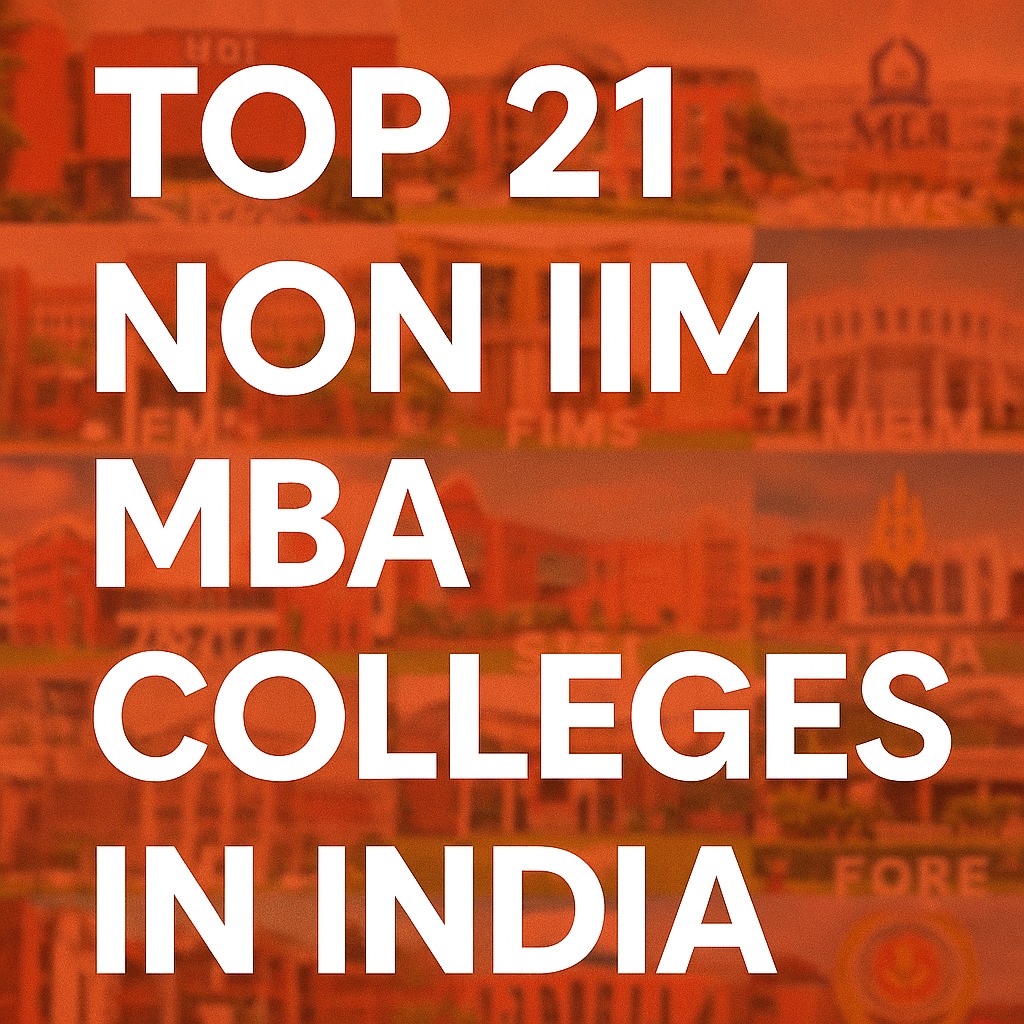Top 21 Non-IIM 2-year MBA/PGDM Colleges in India (2024–25)

Top 21 Non-IIM 2-year MBA/PGDM Colleges in India (2024–25) The following report reviews the key features of the top 25 non-IIM business schools (2‑year full-time MBA/PGDM) in India. For each institute we summarize program highlights, reputation, alumni, fees, placements, recruiters, entrance exams, ROI, campus life, global links, and career prospects. A comparison table at the end highlights key metrics (entrance exam, fees, average salary, etc.). This data is collected from online sources and it is recommended students check official websites for latest verified data. XLRI Jamshedpur (Xavier School of Management) Programs & Curriculum: Two-year full-time PGDM programs in Business Management and Human Resource Management. XLRI’s curriculum is known for its rigorous core subjects and diverse electives (finance, marketing, operations, etc.) plus strong ethics and leadership emphasis. Reputation & Infrastructure: One of India’s oldest top B-schools; consistently ranked among the best (NIRF 2024: Rank #9). The lush residential campus (Jamshedpur) includes extensive libraries, case-rooms, sports facilities and technology labs. Alumni & Legacy: XLRI has a powerful alumni network in industry and HR. Notable alumni include Leena Nair (Chief HR Officer, Unilever) and Sandeep Bakshi (CEO, ICICI Prudential), Rakesh Kapoor (ex-CEO, Reckitt Benckiser) etc. This legacy of leaders reflects its long-standing brand. Fees: Total tuition ~₹28.6 lakh for the 2‑year flagship PGDM program (2024‑26). (Approx. ₹14.3L/year, excluding living expenses.) Placements (2024): Median salary ₹29.0 LPA; highest international ₹110 LPA (₹1.1 Cr) and domestic ₹75 LPA. (Top 10% average ~₹52.0 LPA, top 25% ~₹44.3 LPA.) Leading recruiters include major consulting firms, banks and MNCs. For example, Consulting (26% of roles) – McKinsey, BCG, Bain, Accenture Strategy; BFSI (22%) – Goldman Sachs, Citibank, Axis Bank; Sales/Marketing (18%) – HUL, ITC, Nestlé, P&G, Samsung Entrance Exam & Cutoff: XLRI uses the XAT. Typical cutoffs are very high (around 30–32 marks, ~95+ percentile). Outstanding XAT performance (95–99 percentile) is generally required for shortlisting. ROI: Given the high placement packages, ROI is among the best. With fees ~₹14.3L/year and average salaries around ₹30L, many students recoup costs within a year and see strong medium/long-term returns. Campus Culture & Student Life: The fully residential campus fosters an intense but balanced life – strong student clubs (cultural, entrepreneurship, social outreach), sports, and the big “Malhar” cultural fest. Emphasis on “Xavier values” (ethics, service) shapes a close-knit, socially conscious student community. Global Linkages: XLRI has collaborations and student exchange programs with premier global schools. It “has developed academic collaborations and exchange partnerships with prestigious institutes throughout the world”, exposing students to international electives and summer projects. Career Prospects: Graduates enter high-demand sectors (strategy/consulting, finance, tech, FMCG, HR, NGOs) and often advance quickly. Early career surveys show many in leadership or specialist roles; long-term prospects are very strong due to the institute’s brand and network. FMS Delhi (Faculty of Management Studies, DU) Programs & Curriculum: Two-year full-time MBA (University of Delhi). Focus is on core management functions (finance, marketing, HR, operations) with a reputation for finance and marketing rigor. Unique feature: very low-cost MBA (DU department). Reputation & Infrastructure: Consistently among India’s elite B-schools. Though not in NIRF “Management” category (as part of DU), FMS is often ranked alongside top IIMs in media. It is known as the “Oxbridge of India” (affiliated with DU). The campus is located in Delhi University’s North Campus, with lecture halls and proximity to academic resources of DU (libraries, sports, etc.). Alumni & Legacy: Strong alumni in banking and industry. Notables include Romesh Sobti (former CEO, IndusInd Bank) and Neelam Dhawan (former MD, Microsoft India). FMS alumni network is influential in BFSI and consulting. Fees: Extremely low: total ₹2.29 lakh for two years (₹1.15L/year). (Hostel/food, if any, extra but overall student costs are negligible.) Placements (2024): Highest ₹123 LPA; median ₹31.0 LPA; average ~₹34.1 LPA. (For reference, in 2023 batch the average was ₹34.1L, median ₹31L.) Nearly 100% placement. Top roles (and recruiters) span BFSI (27%), marketing (20%), IT/analytics (18%), BFSI/healthcare, etc. Recruiters include Accenture, Adani, Airtel, Amazon, Capgemini, Deloitte, KPMG, Bain, Ola, Wipro, Microsoft, EY, etc.. Entrance Exam: CAT is required. Typical shortlisting cutoff is extremely high (≈99+ percentile); diversity is encouraged via relaxation for female candidates (+5 marks). ROI: The ROI is unparalleled – tuition is only ~2.3L total and average salary ~₹34L. Even entry-level salary fully covers fees in one year, yielding an ROI >1000%. Campus Culture: FMS is small but intense. Students (mostly commuters in Delhi) form tight study networks and active clubs (finance, consulting, sports). Being part of DU’s vibrant campus, there are numerous cultural and technical fests (e.g., Rendezvous), but the B-school itself has no separate campus. Global Linkages: Exchange programs exist through DU’s international MOUs. FMS students occasionally go for short-term exchange with partner universities (subject to DU exchange slots). Career Prospects: FMS graduates are highly sought after in banking, consulting, finance, tech, and government. Given their cost-effectiveness, many FMS alumni rapidly rise to senior roles; several become CFOs or MDs in companies (reflecting the alumni noted above). SPJIMR Mumbai (S.P. Jain Institute of Management & Research) Programs & Curriculum: Two-year PGDM (Business Management) with options for industry-focused electives (Healthcare, Energy, etc.). The pedagogy stresses “Give India” (social sector), Design Thinking, and Global Immersion Programs. Reputation & Infrastructure: Top-ranked private B-school (Financial Times #1 in India, #40 globally for masters’ management 2023). NIRF (2024) ranks SPJIMR ~#20. The modern Mumbai campus (Andheri West) has smart classrooms, an innovation lab, and student residences (optional). Alumni & Legacy: Notable alumni include Debjani Ghosh (President, NASSCOM), Girish Wagh (Executive Director, Tata Motors), Mahesh Madhavan (CEO, Bacardi), among others. SPJIMR’s alumni hold senior positions across industry. Fees: ₹22.5 lakh total for the two-year PGDM (Indians). (There are separate fee structures for specialized PGDMs.) Placements (2024): Average ₹33.0 LPA, median ₹31.5 LPA, highest ₹81.0 LPA. (100% of students placed.) Leading sectors: Consulting (35% of batch) – recruiters included Accenture, BCG, Deloitte, Kearney, PwC; and substantial shares in BFSI, FMCG, Pharma, Tech. Indeed, “FMCG, Consulting, BFSI, Pharma and Tech emerge as top recruiting sectors.”. Entrance Exam: SPJIMR accepts CAT/XAT/GMAT/GRE. The CAT/XAT shortlisting cutoff is
